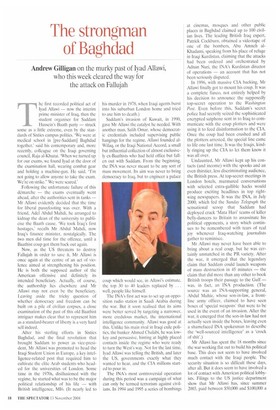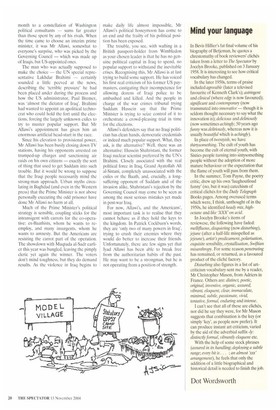The strongman of Baghdad
Andrew Gilligan on the murky past of Iyad Allawi, who this week cleared the way for the attack on Fallujah The first recorded political act of lyad Allawi — now the interim prime minister of Iraq, then the student organiser for Saddam
Hussein's Baath party — struck some as a little extreme, even by the standards of Sixties campus politics. We were at medical school in [pre-Saddam] Baghdad together,' said his contemporary and, more recently, colleague on the Iraqi governing council, Raja al-Khuzai. 'When we turned up for our exams, we found Iyad at the door of the examination hall, wearing combat gear and holding a machine-gun. He said, "I'm not going to allow anyone to take the exam. We're on strike." We were scared.'
Following the unfortunate failure of this de"marche — the exams eventually went ahead, after the authorities sent in tanks — Mr Allawi evidently decided that the time for liberal pussyfooting was over. With a friend, Adel Abdul Mahdi, he arranged to kidnap the dean of the university to publicise the Baath cause. 'We took Iraq's first hostages,' recalls Mr Abdul Mahdi, now Iraq's finance minister, nostalgically. The two men did time for the offence, until a Baathist coup got them back out again.
Now, as the US threatens to destroy Fallujah in order to save it, Mr Allawi is once again at the centre of an act of violence aimed at strengthening his position. He is both the supposed author of the American offensive and definitely its intended beneficiary. Actually, of course, the authorship lies elsewhere and Mr Allawi may not even be the beneficiary. Leaving aside the tricky question of whether democracy and freedom can be built on a pile of civilian corpses, a close examination of the past of this old Baathist intriguer makes clear that to represent him as a standard-bearer of liberty is a very hard sell indeed.
After his sterling efforts in Sixties Baghdad, and the final revolution that brought Saddam to power as vice-president, Mr Allawi was promoted to head the Iraqi Student Union in Europe, a key intelligence-related post that required him to cultivate the elite Arab students who headed for the universities of London. Some time in the 1970s, disillusioned with the regime, he started what was to be the major political relationship of his life — with British intelligence, MI6. (It nearly led to his murder in 1978, when Iraqi agents burst into his suburban London home and tried to axe him to death.) Saddam's invasion of Kuwait, in 1990, gave Mr Allawi the catalyst he needed. With another man, Salih Omar, whose democratic credentials included supervising public hangings for the regime, Allawi founded alWifaq, or the Iraqi National Accord, a small but influential collection of almost exclusively ex-Baathists who had held office but fallen out with Saddam. From the beginning, the INA was never meant to be any sort of mass movement. Its aim was never to bring democracy to Iraq, but to engineer a palace coup which would see, in Allawi's estimate, the top 30 to 40 leaders replaced by . . well, people like himself.
The INA's first act was to set up an opposition radio station in Saudi Arabia during the war. But it soon realised that its aims were better served by targeting a narrower, more credulous market, the international intelligence community. Allawi was good at this. Unlike his main rival in Iraqi exile politics, the banker Ahmed Chalabi, he was lowkey and persuasive, hinting at highly placed contacts inside the regime who were ready to turn the West's way. Not for the last time, Iyad Allawi was telling the British, and later the US, governments exactly what they wanted to hear, and the CIA millions started to pour in.
The INA's most controversial operation during this period was a campaign of what can only be termed terrorism against civilians. In 1994 and 1995 a series of bombings at cinemas, mosques and other public places in Baghdad claimed up to 100 civilian lives. The leading British Iraq expert, Patrick Cockburn, obtained a videotape of one of the bombers, Abu Amneh alKhadami, speaking from his place of refuge in Iraqi Kurdistan. claiming that the attacks had been ordered and orchestrated by Adnan Nun, the INA's Kurdistan director of operations — an account that has not been seriously disputed.
In 1996, with massive CIA backing, Mr Allawi finally got to mount his coup. It was a complete fiasco, not entirely helped by his decision to announce the supposedly top-secret operation to the Washington Post. Even before this, Saddam's secret police had secretly seized the sophisticated encrypted satphone sent in to Iraq to communicate with the coup plotters and were using it to feed disinformation to the CIA. Once the coup had been crushed and all the plotters arrested, the special line came to life one last time. It was the Iraqis, kindly ringing up the CIA to let them know it was all over.
Undaunted, Mr Allawi kept up his contacts (and income) with the spooks and an even thirstier, less discriminating audience, the British press. At top-secret meetings in London hotels, murmured conversations with selected extra-gullible hacks would produce exciting headlines in top rightwing newspapers. It was the INA, in July 2000, which fed the Sunday Telegraph the sensational scoop that Saddam had deployed crack `Mata Hari' teams of killer belly-dancers to Britain to assassinate his political opponents, a story which continues to be remembered with tears of real joy whenever Iraq-watching journalists gather to reminisce.
Mr Allawi may never have been able to bring about a real coup, but he was certainly unmatched in the PR variety. After the war, it emerged that the legendary claim that Saddam could launch weapons of mass destruction in 45 minutes — the claim that did more than any other to book British troops their passage to the Gulf — was, in fact, an INA production. (The source was an INA-supporting general, Abdul Muhie, whose son-in-law, a frontline army officer, claimed to have seen boxes of 'special weapons' that were to be used in the event of an invasion. After the war, it emerged that the son-in-law had not actually seen inside the boxes, leaving even a shamefaced INA spokesman to describe the 'well-sourced intelligence' as a 'crock of shit'.) Mr Allawi has spent the 18 months since the war working flat out to build his political base. This does not seem to have involved much contact with the Iraqi people. The security situation is so difficult these days, after all. But it does seem to have involved a lot of contact with American political lobbyists. Filings to the US justice department show that Mr Allawi has, since summer 2003, paid between $50,000 and $100,000 a
month to a constellation of Washington political consultants — sums far greater than those spent by any of his rivals. When the time came to choose an interim prime minister, it was Mr Allawi, somewhat to everyone's surprise, who was picked by the Governing Council — which was made up of Iraqis, but US-appointed ones.
The man who was actually supposed to make the choice — the UN special representative Lakhdar Brahimi — certainly sounded a little peeved at the news, describing the 'terrible pressure' he had been placed under during the process and how the US administrator, Paul Bremer, was 'almost the dictator of Iraq'. Brahimi had wanted to appoint an apolitical technocrat who could hold the fort until the elections, forcing the largely unknown exiles to try to muster popular support. But Mr Allawi's appointment has given him an enormous artificial head-start in the race.
Since his elevation to provisional power, Mr Allawi has been busily closing down TV stations, having his opponents arrested on trumped-up charges and sanctioning air raids on his own citizens — exactly the sort of thing that used to get Saddam into such trouble. But it would be wrong to suppose that the Iraqi people necessarily mind the strong-man approach. Urban myths circulating in Baghdad (and even in the Western press) that the Prime Minister is not above personally executing the odd prisoner have done Mr Allawi no harm at all.
Much of the Prime Minister's political strategy is sensible, coupling sticks for the intransigent with carrots for the co-operative: ex-Baathists, whom he wants to reemploy, and many insurgents, whom he wants to amnesty. But the Americans are resisting the carrot part of the operation. The showdown with Muqtada al-Sadr earlier this year was bungled, leaving the pimply cleric yet again the winner. The voters don't mind toughness, but they do demand results. As the violence in Iraq begins to make daily life almost impossible, Mr Allawi's political honeymoon has come to an end and the frailty of his political position has been exposed.
The trouble, you see, with wafting in a British passport-holder from Wimbledon as your chosen leader is that he has no genuine political capital in Iraq to spend, no popular support to withstand the inevitable crises. Recognising this, Mr Allawi is at last trying to build some support. He has voiced his first real criticism of his former US paymasters, castigating their incompetence for allowing dozens of Iraqi police to be ambushed and killed. And the people in charge of the war crimes tribunal trying Saddam Hussein say that the Prime Minister is trying to seize control of it to orchestrate a crowd-pleasing trial in time for the elections.
Allawi's defenders say that no Iraqi politician has clean hands, democratic credentials or indeed much popular support. What, they ask, is the alternative? Well, there was an alternative: Hussein Shahristani, the former Iraqi nuclear scientist preferred by the UN's Brahimi. Closely associated with the real political force in Iraq, Grand Ayatollah Ali al-Sistani, completely unassociated with the exiles or the Baath, and, crucially, a longsuffering opponent of Saddam and of the invasion alike, Shahristani's rejection by the Governing Council may come to be seen as among the most serious mistakes yet made in post-war Iraq.
For now, Allawi's, and the Americans', most important task is to realise that they cannot behave as if they hold the keys to the kingdom. In Patrick Cockburn's words, they are 'only two of many powers in Iraq', trying to crush their enemies where they would do better to increase their friends. Unfortunately, there are few signs yet that Iyad Allawi has been able to break free from the authoritarian habits of the past. He may want to be a strongman, but he is not operating from a position of strength.



























































































 Previous page
Previous page